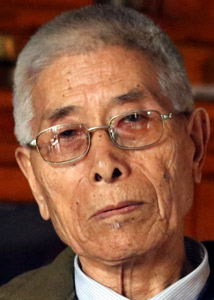Name: Sangay Gonpo
(Alias: No)
Gender: Male
Interview Age: 81
Date of Birth: 1934
Birthplace: Thamay - Karze, Kham, Tibet
Year Left Tibet: 1959
Profession: Farming
Monk/Nun: No
Political Prisoner: No

Interview No.: 39N
Date: 2015-04-14
Language: Tibetan
Location: Tashi Palkhiel, Pokhara, Gandaki, Nepal
Categories: Resistance and Revolution
Keywords: childhood memories, Chinese -- first appearance of, education, farm life, guerrillas in Mustang, Kham, March 10th Uprising, refugee in India -- life as
Summary:
Sangay Gonpo was born in Thamay in Kham Province into a middle class family of farmers who grew barley, wheat and peas. He had four siblings and talks about how loving his mother was. His father passed away when he was a little child, but the family was able to hire workers to help in the fields. The crops were for their own consumption and the surplus was bartered for butter and meat with the nomads that visited his village in autumn. During the wintertime he was able to learn reading and writing from a village elder.
Sangay Gonpo explains how the Chinese came into his village from across the Mekong River. The Chinese called many meetings, began to confiscate guns and horses, and segregated the community into rich and poor classes to incite the poor against the rich. Sangay Gonpo followed 30-40 horsemen out of his village and hoped to join the Chushi Gangdrug [Defend Tibet Volunteer Force] after more Chinese occupied the region. Along the way he was hit in the leg by a bullet and was then taken on horseback to Lhasa where he met up with his brother.
In Lhasa Sangay Gonpo witnessed the March 10th protest at Norbulingka where the Chinese killed a large number of people. He describes his journey through Nepal into India, where he joined a road crew and then returned to Nepal to become a soldier in Mustang to challenge the Chinese army.
Interview Team:
- Marcella Adamski (Interviewer)
- Tenzin Yangchen (Interpreter)
- Dhiraj Kafle (Videographer)

